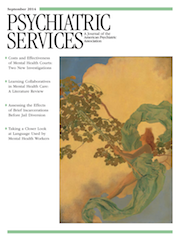People with mental illness are commonly stigmatized and consequently feel socially isolated. Romantic relationships can be particularly difficult for them to establish and sustain because such relationships typically require more commitment than friendships or even family connections. Hence, many if not most people with mental illness, particularly serious mental illness such as schizophrenia, do not have longstanding romantic relationships.
Internet dating has become a popular way to find romantic relationships within the general population. For many people with mental illness, this resource may be especially helpful, because social isolation may impede finding dating connections through friends or family. To address this need, a few Web sites have been established for people with mental illness who are interested in dating, such as
www.MentalHealthDating.com. These Web sites often require user fees, at least for full use. Because many people with mental illness do not have the means to pay for such use, the first two authors established a fully free online dating site (
www.nefesh.co) for people in Israel with mental illness (
nefesh means soul in Hebrew, and the slogan of the Web site is “
nefesh el nefesh,” or “soul to soul”).
The Rofès established this self-funded Web site in September 2012 and have learned from their own experience how to manage and maintain it. Each of the first two authors has a mental illness and publicly advocates for rights of people with mental illness. Their relationship of more than 15 years is sustained in part by sharing similar mental health–related experiences, which leads to mutual empathy and support, and their love for each other has facilitated their individual recovery. The last author (AR) acknowledges the Rofès’ courage in publicly disclosing their mental illness and persistently advocating for people with mental illness in Israel.
As of July 1, 2014,
www.nefesh.co had 1,036 users, although as with most Web sites, this number fluctuates because of subscribing and unsubscribing behavior. The general population of Israel is approximately seven million. The ratio of male to female subscribers is approximately 3 to 1, which is the ratio often found on general dating Web sites. Approximately two to three new visitors have been registering on the site daily, and 47% of users have also posted a photo of themselves (which is more than occurs on some general dating Web sites and suggests that this Web site may reduce its subscribers’ concerns about stigma). The Rofès self-fund the maintenance and server storage for the Web site, which currently costs approximately $135 per year. The first author (DV-R) operates and manages the site and provides technical support for it. Friends of the first two authors have made occasional contributions to cover the Web site’s costs.
Although users are not required to report their dating outcomes from using this Web site, some couples who have met on the site have sent unsolicited information. Sometimes the Rofès have received thank you notes via the Web site’s e-mail address and Facebook page, as well as in person from acquaintances and friends. In late 2013 they were invited to attend a dinner celebration held by a couple who had met on the Web site and had started cohabiting; since the couple first met, the woman has returned to work after years of self-isolation at home. In June 2014, they were invited to the wedding of an elderly couple who met on the Web site. Users have reported experiences of short-term relationships as a result of using the Web site, and some users have returned to the site to try their luck again, sometimes with more success than they had the first time. One user complained that she was being harassed by another site user. The Rofès contacted the reportedly harassing user with a message that another (unidentified) user complained that he was harassing her by phone and asked him not to do so if the allegation was true. He unsubscribed, and the first two authors decided not to intervene in similar conflicts in the future.
Further development and more rigorous evaluation of both online and dating initiatives could be helpful to better understand related processes and outcomes and to further improve and support services for people with mental illness.

